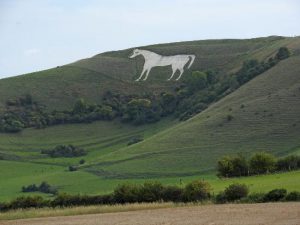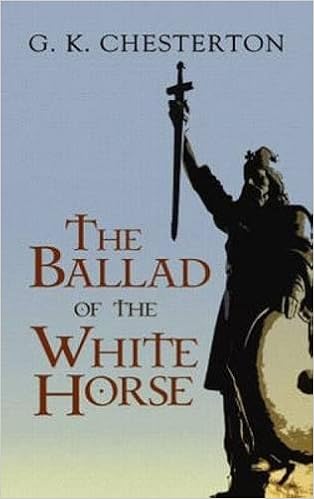 In the Anglican tradition – I’m not sure if the Ordinariates pick this up – today King Alfred the Great is commemorated, on the anniversary of his death. He was a pivotal figure in the history of England, and a scholar who, among other things, translated the Consolation of Philosophy by Boethius.
In the Anglican tradition – I’m not sure if the Ordinariates pick this up – today King Alfred the Great is commemorated, on the anniversary of his death. He was a pivotal figure in the history of England, and a scholar who, among other things, translated the Consolation of Philosophy by Boethius.
Some years ago, during a trip to Blighty, I zoomed down a road to a meeting of clergy, which I fondly remember, inter alia, for the fellowship. As we zoomed, I exclaimed, “What’s that?”
I was looking at the enormous figure of a white horse on a hillside. It was one of the great chalk figures, which dot the countryside, the turf cut down to the chalk to expose the shape. It was striking. I understand that there are quite a few in southern England and I’d like to see all of them someday.
In any event, do you know G.K. Chesterton’s poem, The Ballad of the White Horse? King Alfred is the subject of the work.
This is an epic poem, and, as such, it runs contrary to the spirit of our time, in that it is, well, an epic, and not a tweet. However, as an epic, it is also an antedote to our day.
As Chesterton wrote of it in a prefatory note:
Alfred has come down to us in the best way (that is, by national legends) solely for the same reason as Arthur and Roland and the other giants of that darkness, because he fought for the Christian civilization against the heathen nihilism.
Isn’t that the struggle we are engaged in now?
We are in a situation where we even see, within the Church, the agents of heathen nihilism at work, much as the Red Guards did in China’s Cultural Revolution. There are new catholic Red Guards now. HERE
King Alfred fought an important battle on a field which, today, is overlooked by one of the great chalk horses. It must be an enormous task to keep these horses clear of overgrowth by weeds. Chesterton uses the image of tending the horses in his poem.
Here is a taste from Book VIII: “The Scouring of the Horse”. As you read, think of Fishwrap… Martin… Spadaro… Faggioli… Mickens… La Civiltâ Cattolica… Amerika… (my emphases):
“I know that weeds shall grow in it
Faster than men can burn;
And though they scatter now and go,
In some far century, sad and slow,
I have a vision, and I know
The heathen shall return.“They shall not come with warships,
They shall not waste with brands,
But books be all their eating,
And ink be on their hands.“Not with the humour of hunters
Or savage skill in war,
But ordering all things with dead words,
Strings shall they make of beasts and birds,
And wheels of wind and star.“They shall come mild as monkish clerks,
With many a scroll and pen;
And backward shall ye turn and gaze,
Desiring one of Alfred’s days,
When pagans still were men.“The dear sun dwarfed of dreadful suns,
Like fiercer flowers on stalk,
Earth lost and little like a pea
In high heaven’s towering forestry,
—These be the small weeds ye shall see
Crawl, covering the chalk.
They crawl… covering the whiteness of the chalk.
They crawl. And they don’t fight like men.



































OnePeterFive had Yeats’s “Second Coming” and now you have “Ballad of the White Horse.” They are some of the most memorable poems I read in College or High School. Thanks both of you for sharing!
I think frequently of how “the centre cannot hold” these days.
Thank you so much dear Father for posting this! It might be a false memory but it seems to me that I told you how much I liked the “Ballad” when we met in Grand Rapids in June. Actually, it was the last book read by Russell Kirk on his deathbed. It’s also one of the five books that I consider as my own “survival kit”, together with the Bible, Dante’s “Divine Comedy”, “Lepanto”, by the same Chesterton, and “The Dream of Gerontius”, by the Blessed John Henry Newman.
Thank you! I saw the white horse a few years ago, although it was so foggy that particular day that I could barely make it out. However I knew the poem so it meant a lot to me. I’m not a former Anglican or an Anglophile in general, but I am a great lover of poetry and I wish all Catholics would get back to our wonderful poetic heritage. This is something we totally ignore and in fact have ignored for decades now.
Somebody up the thread mentioned the Dream of Gerontius. Newman was a remarkable person and a remarkable writer, and should probably be canonized (but it ain’t gonna happen now). This is probably his best poem, although Lead Kindly Light is definitely in the running too.
The Dream of Gerontius is beautiful as a poem but was set to music by Sir Edward Elgar. If you listen to the Elgar version, you will be reduced to tears. It’s not performed very often, because it requires great soloists and a seriously good chorus. But it makes you weep, partly because of its subject and partly because of what we have lost.
“We are in a situation where we even see, within the Church, the agents of heathen nihilism at work, much as the Red Guards did in China’s Cultural Revolution. There are new catholic Red Guards now.”
This site always offers the truth, plainly and respectfully, but for some reason I cannot recall one that stings with the brutal truth as clearly. Thank you for putting this reality front and center.
God reward you.
Shortly thereafter is the better part:
(it contains one of my favourite words – “Wot”)
“Will ye part with the weeds for ever?
Or show daisies to the door?
Or will you bid the bold grass
Go, and return no more?
“So ceaseless and so secret
Thrive terror and theft set free;
Treason and shame shall come to pass
While one weed flowers in a morass;
And like the stillness of stiff grass
The stillness of tyranny.
“Over our white souls also
Wild heresies and high
Wave prouder than the plumes of grass,
And sadder than their sigh.
(…)
“And though skies alter and empires melt,
This word shall still be true:
If we would have the horse of old,
Scour ye the horse anew.
“One time I followed a dancing star
That seemed to sing and nod,
And ring upon earth all evil’s knell;
But now I wot if ye scour not well
Red rust shall grow on God’s great bell
And grass in the streets of God.”
Lovely poetry is truly a gift of God. So much said and not said, so much evoked by one turn of phrase. Thank you for posting this. I was not familiar with this one.
Thank you so much for posting this, Father! It’s frighteningly accurate in its description of today’s world.